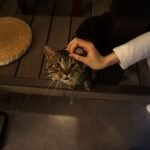Ever wondered if you’re truly meant for feline companionship? While cats have conquered the internet and countless hearts, they’re definitely not for everyone. Your personality type, lifestyle preferences, and social tendencies might reveal more about your pet compatibility than you think.
Studies suggest significantly more Americans identify as dog people compared to cat people. That leaves a significant number of people somewhere in between or completely uninterested in either furry option. Understanding your true preferences can save both you and a potential feline friend from an incompatible match. Let’s explore the telltale signs that might indicate cats aren’t your ideal companion.
You Crave Control in Your Relationships

Does the idea of unpredictable affection make you uncomfortable? A cat might ignore you for hours then demand lap time during your important Zoom call, being aloof when you want cuddles but velcroing themselves to you when you’re trying to cook, and this unpredictability drives control-seekers wild. If you’re someone who needs emotional responses you can trigger reliably, cats will frustrate you.
You might need emotional responses you can trigger reliably, like pressing a button and receiving a treat, and the idea that affection might be a gift rather than a transaction genuinely distresses some people. When explaining pet preferences, phrases like “You can train a dog” or “Dogs know who’s boss” reveal a deep need to be in charge of the relationship. Cats famously do not recognize human authority, and while they might acknowledge your existence or even grow fond of you, it’s their choice, not your achievement, which exposes people who can’t handle not being the selector.
You’re Extremely Social and Outgoing

Dog people are usually perceived as outgoing, extroverted, and social, thriving in group settings and enjoying activities that involve other people, such as outdoor sports, social gatherings, or community events. If large gatherings energize you and solitude feels uncomfortable, you might not connect with cats’ independent nature.
Research suggests that dog people tend to be more extroverted than cat people, with both dimensions being associated with social orientation. Dog people enjoy going outside, as they get the opportunity to socialize with neighbors and other dog walkers. If you’re someone who draws energy from constant human interaction and finds quiet evenings at home draining rather than restorative, cats might leave you feeling understimulated.
You Take Everything Personally

Do you interpret neutral behaviors as rejection? Some people read a cat sitting across the room as “he hates me” or a cat walking past without stopping as “she’s ignoring me,” reading malice into normal feline behavior and being unable to accept that not every action is about them. This reveals people who view all interactions through a lens of personal acceptance or rejection.
The cat isn’t rejecting them, it’s just being a cat, but they can’t see animals as having their own motivations unrelated to humans, which reveals people who interpret all behavior through a lens of personal acceptance or rejection. If you struggle to understand that animals have their own internal lives and motivations beyond human interaction, feline independence will feel like constant personal slights.
You Prefer Highly Structured Routines

Studies indicate dog people tend to be more conscientious than cat people, with conscientiousness being a tendency to show self-discipline, complete tasks, and aim for achievement, showing a preference for planned rather than spontaneous behavior. If you thrive on predictable schedules and detailed planning, cats’ unpredictable nature might clash with your needs.
When you opt to have a dog in your life, you know that you’ll be taking your pet outside for multiple walks daily, and some breeds need long walks and even runs to get the required exercise, so if you’re a dog person, you tend to be more energetic. People who flourish with rigid daily structures often prefer the predictable routine that dogs provide over the spontaneous affection cats offer when they feel like it.
You Struggle with Independent Thinking

Cats are noted for “doing their own thing” whereas dogs tend to “follow the crowd,” and people who are high in openness to experience tend to be non-conformists who like to follow their own interests rather than blend in with other people. If you find comfort in following established patterns and feel uncomfortable with unconventional approaches, cats might not appeal to you.
Cat lovers were more introverted, open-minded and sensitive, and cat people also tended to be non-conformists, with some studies suggesting differences in cognitive measures compared to dog lovers. Research found that cat owners were more likely to be curious, unconventional in thinking and actions, and more prone to worry than dog people. If you prefer conventional thinking and established ways of doing things, you might not relate to the typical cat person mindset.
You Have Low Tolerance for Unpredictability

Cats don’t operate on a transaction model, and their affection arrives like weather – unpredictable, unearned, uncontrolled, which bothers people who need to trace every outcome to their own actions and prefer relationships where they can point to exactly what they did to deserve the response they’re getting. This need for cause-and-effect clarity makes cat ownership challenging.
If unexpected changes in plans stress you out significantly, or if you become anxious when you can’t predict outcomes, cats will constantly trigger that discomfort. Their moods shift based on internal factors you’ll never fully understand or control, creating an environment that might feel chaotic to someone who needs predictable patterns.
You Announce Your Pet Preferences Unprompted

The declaration arrives unprompted at dinner parties when someone mentions their cat did something mildly amusing, with people announcing “I’m not a cat person” with the kind of emphasis usually reserved for stating allergies or religious beliefs, performing it complete with a small shudder and a face that suggests cats personally wronged their ancestors.
They need it on the record that they are Not A Cat Person, wearing it like a badge and bringing it up in conversations that weren’t about pets, even including it in dating profiles as if it’s a personality trait rather than a preference, though people who simply prefer dogs don’t do this – they just have dogs. This defensive behavior often reveals deeper control issues or discomfort with animals that don’t conform to human expectations.
You Need Constant Validation and Attention

Dog people can be more laidback and easygoing and tend not to sweat the small stuff, and being extroverts can also make them more generally agreeable. However, if you need constant positive feedback and struggle when attention isn’t focused on you, cats will leave you feeling neglected. Dogs are social animals and thrive on human companionship, providing the consistent interaction some personalities require.
Dog people are generally seen as loyal and affectionate, enjoying frequent interaction and open displays of affection, and they value companionship and often seek relationships that are as enthusiastic and supportive as their canine friends. If you’re someone who measures love by frequency of interaction rather than quality of connection, feline affection might feel insufficient even when it’s genuine.
Conclusion

Recognizing these signs doesn’t make you a bad person; it simply means you understand your own needs and preferences. The people who can’t handle cats aren’t really rejecting cats – they’re rejecting the mirror cats hold up, the one that shows how much control they need and how uncomfortable they are when they can’t have it. Self-awareness about your personality type can lead to better pet choices and happier relationships for everyone involved.
There are differences between cat people and dog people, but the one thing we all have in common is a love for an animal we consider to be a member of our family. Whether you’re drawn to loyal dogs, independent cats, or no pets at all, the most important thing is honest self-reflection about what kind of companion would truly fit your lifestyle and emotional needs.
What do you think about these personality differences? Have you noticed any of these traits in yourself or others around you?






